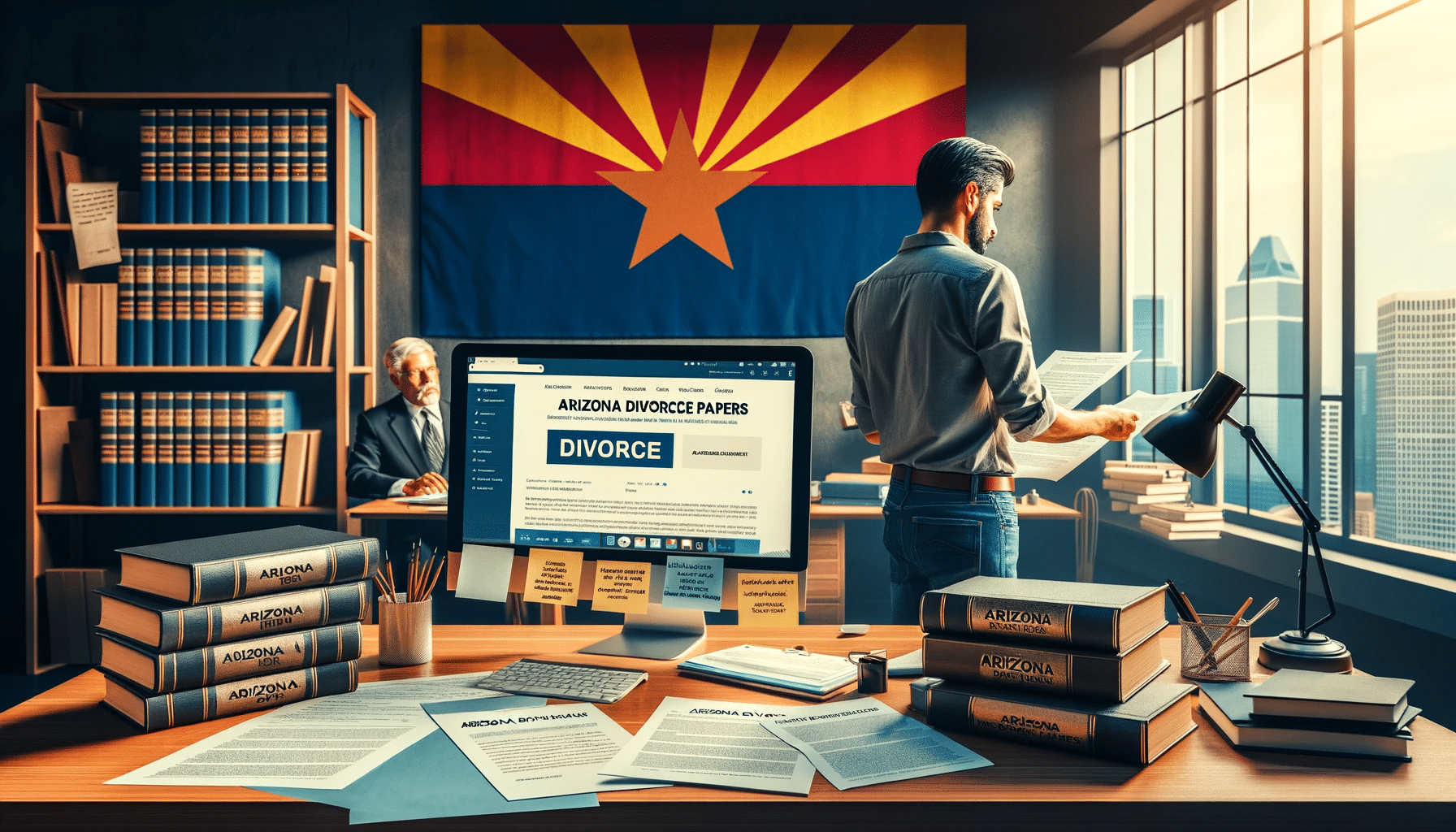Physical Address
304 North Cardinal St.
Dorchester Center, MA 02124
Physical Address
304 North Cardinal St.
Dorchester Center, MA 02124

Embarking on the process of filing for divorce in Arizona can feel like navigating the vast, arid expanses of the Grand Canyon State — a journey that melds legal complexities with personal transformation. Arizona’s divorce laws present a unique terrain, each with its own set of rules and procedures that need careful attention.
From understanding residency requirements to deciphering the intricacies of legal documentation, each step is crucial in this journey. But, you don’t have to traverse this desert alone. This article is your guide, helping you navigate the landscape of Arizona’s divorce laws.

We’re here to demystify the legal terms and empathize with the emotional aspects of this process. Ready to embark on this path in Arizona? Keep reading to learn about the essential steps for filing for divorce in Arizona, and begin your journey towards a new chapter with clarity and support.
For more on how to file for divorce, check out our article, How to File for Divorce: A Concise Guide for Couples.
To legally file for divorce in the state, you must meet certain conditions that establish your standing as a divorcing party.
In Arizona, either you or your spouse must have lived in the state for at least 90 days before filing for divorce. This residency requirement ensures that Arizona has jurisdiction over your divorce case.
If you do not meet this requirement, you may have to wait until you establish residency in the state.
When it comes to eligibility for divorce in Arizona, there are no additional specific criteria that can disqualify you from filing. As long as you or your spouse meet the residency requirement, you can proceed with the divorce process.
| Eligibility and Residency Requirements for Divorce in Arizona | |
|---|---|
| Eligibility Requirements | At least one party must have lived in Arizona for 90 days prior to filing for divorce. |
| Residency Requirements | No additional specific criteria; meeting the 90-day residency requirement is sufficient. |

In Arizona, the primary ground for divorce is the marriage being irretrievably broken. This means that there is no possibility of reconciliation between the spouses.
Unlike some states that require specific reasons such as adultery or abandonment, Arizona allows for a no-fault divorce based on the irretrievable breakdown of the marriage.
It is worth noting that Arizona also recognizes covenant marriages, which have additional requirements and grounds for divorce. In a covenant marriage, the grounds for divorce include adultery, physical or sexual abuse, substance abuse, imprisonment, and abandonment for at least one year.
If you are in a covenant marriage and are seeking a divorce, you’ll want to consult with an attorney to understand the specific requirements and proceedings.
| No-Fault Divorce | Covenant Marriage |
|---|---|
| Marriage is irretrievably broken | Adultery |
| Physical or sexual abuse | |
| Substance abuse | |
| Imprisonment | |
| Abandonment for at least one year |
Before filing for divorce in Arizona, you can take certain steps to ensure a smoother process. By adequately preparing, you can gather the necessary documents and seek the right support to navigate this challenging time.
Here are some key steps to consider:
| References | |
|---|---|
| Arizona Judicial Branch | https://www.azcourts.gov/familylaw/FilingforDivorce.aspx |
| Arizona Revised Statutes | https://www.azleg.gov/arsDetail/?title=25 |
If you’re ready to file for divorce, this section will guide you through the necessary steps to ensure a smooth filing experience.
Once you have gathered all the necessary information and documents, it’s time to fill out and file the divorce forms in Arizona. Take the time to carefully complete the forms, paying attention to accuracy and completeness.
Arizona requires specific forms to be filled out when filing for divorce. These forms can vary depending on your circumstances, such as whether you have children or not. Be sure to use the correct forms to avoid delays or complications in your divorce case.
| Form Name | Description |
|---|---|
| Petition for Dissolution of Marriage | This form initiates the divorce process and provides the court with information about you, your spouse, and your marriage. |
| Child Custody and Parenting Time Order | This form outlines the parenting plan and custody arrangements if you have minor children. |
| Child Support Order | This form details the child support obligations and payments if applicable. |
| Spousal Maintenance Order | This form addresses any request for spousal support or alimony. |
| Financial Affidavit | This form requires a detailed disclosure of your financial information, including income, assets, and debts. |
Once you have completed the necessary forms, you will need to file them with the appropriate county court in Arizona. Visit the court’s website or contact the clerk’s office to determine the specific filing requirements and any associated fees.
Remember to keep copies of all the filed forms for your records. These documents will play a crucial role throughout the divorce process and may be needed for future reference or court hearings.
Each divorce case is unique, and it’s always recommended to seek legal advice or assistance if you have any questions or concerns during the process of filling out and filing divorce forms in Arizona.

The filing process takes place at the county level, specifically at the county courts. Each county in Arizona has its own court system, and you must file your divorce petition in the county where you or your spouse currently reside.
Before filing, make sure you meet the residency requirements for the county where you plan to file. In most cases, you or your spouse must have lived in the county for at least 90 days prior to filing for divorce. Consult the specific rules and requirements of the county court where you intend to file, as they may vary slightly.
When filing for divorce, you will need to pay a filing fee, which also varies by county. The fee covers the cost of processing your divorce case and may differ depending on whether you have children or other specific circumstances.
You can find information about the filing fees and acceptable methods of payment on the county court’s website or by contacting the court directly.
It’s worth noting that some county courts offer online resources and forms to help individuals navigate the divorce filing process. These resources can provide guidance on completing the necessary paperwork and may save you time and effort.
However, if you have complex legal issues or need personalized advice, it’s recommended to consult with an attorney specializing in family law.
Some counties have their own unique things you need to do when filing for divorce. That’s why we’ve created county-specific filing guides. If you don’t see your county below, please contact us and we’ll work on creating one!
After filing, you must serve your spouse with the divorce papers.
Serving divorce papers involves providing formal notice to your spouse, and informing them about the divorce case.
In Arizona, there are different methods of serving papers, including acceptance of service, mail service, and in-person service.
If you are the petitioner (the spouse initiating the divorce) you have the responsibility to serve the divorce papers to the respondent, your spouse. You can choose to use a process server or ask the county sheriff’s office to serve the papers on your behalf.
Alternatively, you can opt for acceptance of service, where your spouse signs a notarized Acceptance of Service form to acknowledge receipt of the divorce papers.
As the respondent, you have to respond to the divorce petition within the specified timeframe. Typically, you have 20 days to file a response after being served with the divorce papers.
Failure to respond could result in a default judgment, where the court may grant the divorce based on the petitioner’s requests alone.
When responding to the petition, you have the option to contest or agree to the terms outlined in the divorce petition. If you disagree with any aspects, such as child custody or division of assets, it is advisable to consult with an attorney to ensure your rights are protected.
Your response should be filed with the court and served to the petitioner to initiate further proceedings in the divorce case.
| Method of Serving Divorce Papers | Pros | Cons |
|---|---|---|
| Acceptance of Service | – Less formal and less costly – Allows for amicable proceedings – Avoids the need for process servers | – Requires cooperation from the respondent – May not be suitable if communication is strained |
| Mail Service | – Cost-effective and convenient – Allows for proof of service | – Limited if the respondent is uncooperative – May require additional efforts to ensure receipt |
| In-Person Service | – Ensures direct delivery to the respondent – Provides proof of service | – Can be confrontational or emotional – Requires hiring a process server or involving law enforcement |

Next, let’s touch on the importance of financial disclosures. These disclosures provide transparency and ensure that both parties have an accurate understanding of the marital assets, debts, and financial situation.
To fulfill the requirement of financial disclosures, both spouses are required to provide a complete and accurate picture of their individual and joint finances. This includes information on income, assets, debts, bank accounts, investments, retirement accounts, and any other relevant financial information.
Withholding or misrepresenting financial information can have severe consequences, including penalties and potential reversal of the divorce settlement.
Once both parties have completed their financial disclosures, the information will be reviewed by the court and used to determine the division of assets and debts.
| Steps for Completing Financial Disclosures in Arizona Divorce |
|---|
| 1. Gather all relevant financial documents, such as bank statements, tax returns, and investment account statements. |
| 2. Create a comprehensive list of assets and debts, including real estate, vehicles, credit cards, loans, and any other financial obligations. |
| 3. Organize the information into clear and easily understandable formats, such as spreadsheets or tables. |
| 4. Fill out the required financial disclosure forms provided by the court accurately and honestly. |
| 5. Submit the completed financial disclosures to the court and serve a copy to the other party. |
By completing the financial disclosures and providing all necessary information, you can help ensure a smoother and more efficient divorce process. It is recommended to seek legal advice or consult with a divorce attorney to navigate the complexities of financial disclosures and ensure compliance with Arizona’s divorce laws.
If you’re considering filing for divorce in Arizona and you want to save on legal fees, you may choose to proceed without an attorney. Filing for divorce without professional legal representation is commonly referred to as a DIY divorce.
While it can be a cost-effective option, it’s important to understand the process and the potential challenges you may face.
Before diving into a DIY divorce, assess your eligibility and ensure you meet the residency requirements for filing in Arizona. Additionally, familiarize yourself with the grounds for divorce in the state. Understanding these key factors will help you determine if a DIY divorce is a suitable option for your situation.
While DIY divorce can be manageable for couples with minimal assets and no disputed issues, you’ll need to recognize the complexity of the legal procedures involved. You’ll need to prepare and complete the necessary divorce forms accurately, ensuring no crucial information is missed.
Keep in mind that filing for divorce without an attorney means taking on the responsibility of serving divorce papers and responding to the petition on your own. These tasks require strict adherence to legal guidelines and procedures.
Educate yourself on the proper methods of serving divorce papers and the appropriate response timelines to avoid any complications or potential legal repercussions.
Although a DIY divorce in Arizona is feasible for some individuals, it has its limitations. Complex issues such as child custody, division of significant assets, or negotiations regarding spousal support may require the expertise of an attorney.
Consulting with a family law professional, even on a limited basis, can provide valuable insights and guidance, ensuring your rights and interests are protected throughout the divorce process.
Divorce is a challenging process, but with the right information and preparation, you can navigate it successfully. Remember, before proceeding with a divorce in Arizona, ensure that you meet the eligibility and residency requirements.
Familiarize yourself with the grounds for divorce, particularly the irretrievable breakdown of the marriage, and any specific considerations for covenant marriages.
In conclusion, filing for divorce in Arizona requires careful consideration and preparation. Remember to seek legal advice and support when needed. While the process may be challenging, it is a necessary step towards a new chapter in your life.
Find the support and resources you need, and take each step with confidence, knowing that you have the knowledge to navigate the process successfully.
To see how this process of filing for divorce in Arizona compares to that in other states, check out our articles about how to file for divorce in New Mexico and filing for divorce in Utah.
To file for divorce in Arizona, either you or your spouse must have lived in the state for at least 90 days before filing.
In Arizona, the primary ground for divorce is that the marriage is irretrievably broken. However, if you have a covenant marriage, specific grounds for divorce include adultery, abandonment, abuse, drug addiction, and living separately for at least two years.
Prior to filing for divorce, it’s important to gather all necessary documents such as financial records, marriage certificates, and property deeds. It can also be helpful to seek counseling or explore alternative dispute resolution methods like mediation.
You have the option to hire a lawyer to handle your divorce, file for divorce on your own (DIY divorce), or use an online divorce service. The best option for you will depend on your specific circumstances and comfort level with the legal process.
You must file for divorce in the county where either you or your spouse resides. Each county in Arizona has its own family court system. You can find more information and resources online or by contacting the county court directly.
It’s crucial to accurately and completely fill out divorce forms to ensure your case proceeds smoothly. You can obtain the necessary forms from the county court or online resources. Once completed, you must file the forms with the court and pay the required filing fees.
Divorce papers must be properly served to the respondent, who then has a legal obligation to respond to the petition. Service options include acceptance of service, mail service, or in-person service. It’s important to follow legal procedures to ensure proper service.
In Arizona, both parties are required to complete financial disclosures, which include providing information about income, expenses, assets, and debts. Ensuring accurate and thorough financial disclosures is important for a fair and equitable resolution of your divorce case.
The timeline for finalizing a divorce in Arizona varies depending on several factors, including the complexity of the case and court availability. On average, it can take several months to a year or more to obtain a final divorce decree.
Yes, it is possible to file for divorce in Arizona without hiring an attorney. This is commonly referred to as a DIY divorce. However, it’s important to consider the potential complexities and risks involved and to seek legal advice or assistance when necessary.